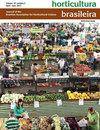Bio-agronomic efficiency indices of eggplant and tomato intercropping
IF 0.8
4区 农林科学
Q4 HORTICULTURE
引用次数: 2
Abstract
ABSTRACT The successful intercropping with vegetables depends on the type of crops grown and on the proper handling of tested treatments, such as the time of transplanting a crop in relation to transplanting another crop, among others. Thus, the objective of this work was to evaluate the bio-agronomic performance of eggplant and tomato for industry, in intercropping, in relation to their single crops, as a function of the transplanting time of the eggplant in relation to the tomato and of the cultivation season (summer or winter). The experimental design used was a randomized complete block with ten treatments and four replications, implanted in two growing seasons (from February to September and from August to February), where the treatments consisted of ten eggplant transplanting times (-30, -25, -20, -15, -10, -5, 0, +5, +10 and +15 days in relation to tomato transplantation). In each block, plots of eggplant monocultures were planted in each transplanting time, as well as a plot in tomato monoculture in order to obtain the bio-agronomic indices. The competition and bio-agronomic efficiency indices of the crops and of the intercropped systems were evaluated. The variation in the transplanting time of eggplant in relation to tomato significantly interferes in the bio-agronomic performance of both species. Eggplant transplanting performed between -20 and -15 days compared to tomato transplantation reduces the dominance of one crop over the other and the interspecific competition for environmental resources. The intercropped system has greater land equivalent ratio when the eggplant is transplanted at +15 days after transplanting the tomato.茄子与番茄间作的生物农艺效率指标
摘要蔬菜间作的成功与否取决于种植的作物类型和试验处理的正确处理,例如移植一种作物与移植另一种作物的时间等。因此,这项工作的目的是评估茄子和番茄在间作中相对于其单一作物的生物农艺性能,作为茄子相对于番茄的移植时间和栽培季节(夏季或冬季)的函数。所用的实验设计是一个随机的完整组,有十个处理和四个重复,在两个生长季节(2月至9月和8月至2月)植入,其中处理包括十个茄子移植时间(与番茄移植有关的-30、-25、-20、-15、-10、-5、0、+5、+10和+15天)。在每个地块中,在每个移植时间种植茄子单作地块和番茄单作地块,以获得生物农艺指标。对作物和间作系统的竞争性和生物农艺效率指标进行了评价。茄子与番茄移植时间的差异显著干扰了两个品种的生物农艺性能。与番茄移植相比,茄子移植在-20至-15天之间进行,减少了一种作物对另一种作物的优势以及对环境资源的种间竞争。番茄移栽后+15天茄子移栽时,间作系统具有较大的土地当量比。
本文章由计算机程序翻译,如有差异,请以英文原文为准。
求助全文
约1分钟内获得全文
求助全文
来源期刊

Horticultura Brasileira
农林科学-园艺
CiteScore
1.40
自引率
28.60%
发文量
45
审稿时长
4-8 weeks
期刊介绍:
The journal Horticultura Brasileira, a quarterly journal, is the Official Publication of the Sociedade de Olericultura do Brasil.
Its abbreviated title is Hortic. bras., and it should be used in bibliographies, footnotes, references and bibliographic strips.
 求助内容:
求助内容: 应助结果提醒方式:
应助结果提醒方式:


